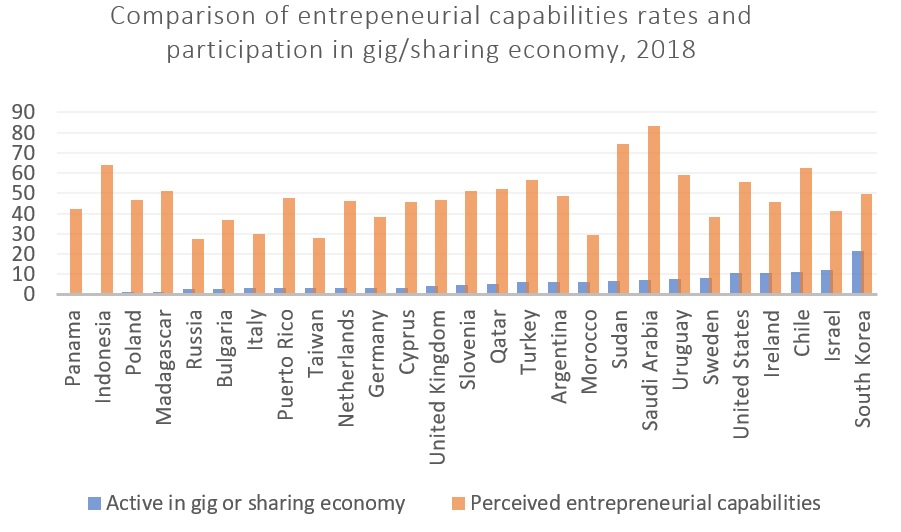People who participate in the gig or sharing economies may have many reasons for doing so. They may have a job but need additional income, they may enjoy the work’s flexibility; or they may have an entrepreneurial mindset and the gig economy matches their preferences. In this last instance the gig and sharing economies offer an opportunity for people with strong entrepreneurial attitudes to apply their skills to a work situation where they can often be their own boss.
Every year GEM teams collect data on such entrepreneurial attitudes, including whether their survey respondents feel they have the skills to become entrepreneurs (perceived capabilities). And in 2018, 27 GEM teams asked their survey respondents if they participated in the gig economy over the past year. (The gig, or sharing economy, is defined by GEM as performing service work such as deliveries, translation, or personal care using a digital platform such as TaskRabbit, Foodora, Uber, Airbnb or Grubhub as examples).
With this collected data it is interesting to see how certain countries’ populations are participating in the gig or sharing economies and how that may compare to their overall entrepreneurial attitudes mentioned about. Do populations with strong entrepreneurial attitudes also have high rates of gig economy participation, or is it a mix? Below is a graph depicting participation in the gig and sharing economies for 27 countries, compared to those countries’ perceived entrepreneurial capabilities:

The results of the comparison vary between countries and does not seem to form a clear pattern depending on a country’s development level. However, in a few cases of high-income countries, there appears to a relatively high proportion of gig/sharing economy participation rate (over 8% of the population) compared to a lower perceived capability score, indicating that the spread of technology and a lower regulatory burden has encouraged gig economy involvement but that a competitive macroeconomy has lowered self-perceptions about having enough capabilities to start a business. The countries in this category are listed below:
| Active in gig or sharing economy | Perceived entrepreneurial capabilities | |
| Korea | 21.5% | 49.7% |
| Israel | 12.3% | 41.5% |
| Ireland | 10.9% | 45.6% |
| USA | 10.8% | 55.6% |
| Sweden | 8.4% | 38.4% |
It is typical for higher income countries to have lower rates of perceived entrepreneurial capabilities as the more competitive business environment in these countries increases the number of skills required to start a sustained business. However, the higher rates of participation indicate that the gig or sharing economies can be a sector where both people who are entrepreneurially-minded and not entrepreneurially-minded work in a way that is at least somewhat entrepreneurial in nature. It will be interesting to see if involvement in the gig and sharing economies increases perceived capabilities over time, particularly if more people start to work in that sector.
More discussion on the gig and sharing economy data collected by GEM teams can be found in section 3.4 of the recently published GEM 2018 / 2019 Global Report. Additionally, GEM plans to release a special report on this topic later this year.
Analysis by Forrest Wright (GEM Global Data Team)

